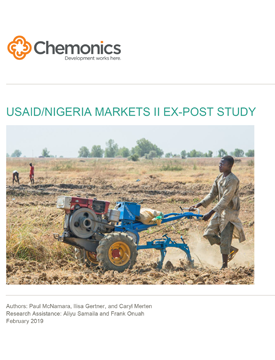Nigerians who farm for a living often face low harvests and sales, which threatens the population’s livelihoods, access to food, and health.

USAID/Nigeria MARKETS II Ex-Post Study .
Paper | February 28, 2019

This paper presents the findings of an ex-post study of USAID’s Maximizing Agricultural Revenue and Key Enterprises in Targeted Sites II (MARKETS II) project in Nigeria.
The $64.9 million MARKETS II project facilitated business partnerships between smallholder farmers and end-buyers in the processing segment of seven value chains. Complementing MARKETS II’s key strategy was its requirement that 50 percent of participants be women and 30 percent of participants be youth, along with its decision to reduce land-size requirements to increase inclusion and participation in agricultural markets.
Our qualitative research revealed that MARKETS II’s beneficiaries continue to employ improved agronomic practices and have maintained or evolved market linkages. Women are expanding agricultural activities and diversifying business opportunities. Youth are investing in themselves, staying in rural areas, and creating niche business opportunities along the value chain, spreading technology and providing extension services. Sustained and evolving market linkages continue, and competition has built demand — three major rice processors now buy from Kebbi state, as opposed to just one prior to the project — and business-minded farmers sell within outgrower schemes and to the open market, depending on profitability. This research provides valuable information about sustained practices and activities one year after closeout of a large-scale USAID agriculture project.
